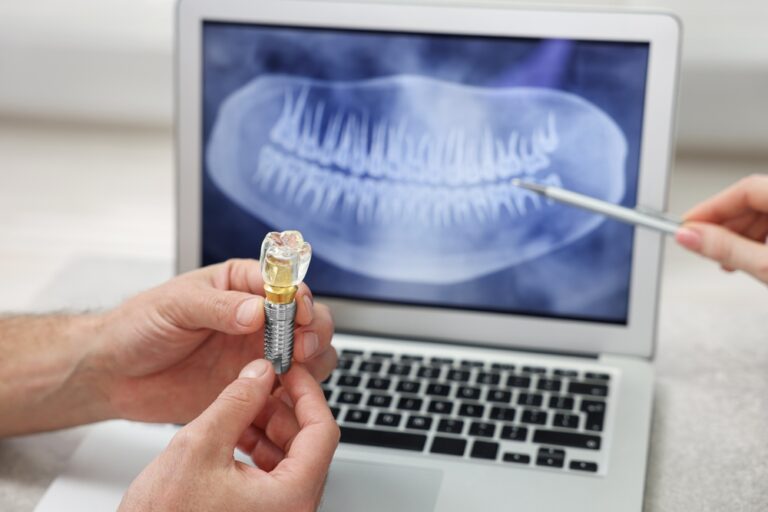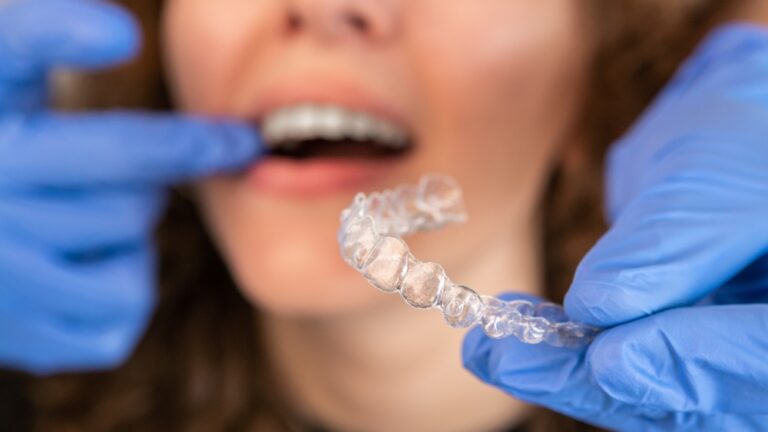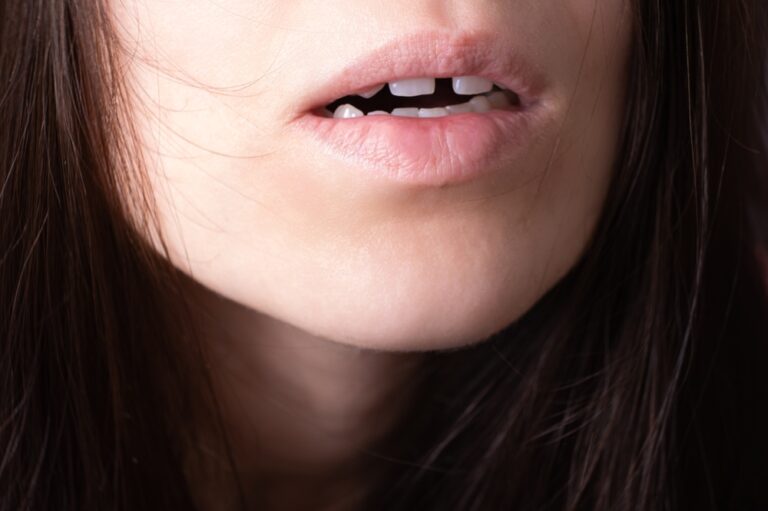False teeth, whether full or partial dentures, are susceptible to staining and discoloration over time. Dentures are made from porous acrylic resin that can absorb pigments from food, drinks, tobacco, and oral bacteria. Stains tend to accumulate gradually in microscopic crevices in the denture surface. While diligent cleaning can help minimize staining, many denture wearers still struggle with stubborn coffee, tea, wine, and tobacco stains that are difficult to remove completely. Thankfully, there are effective methods both at home and professionally to deep clean stained dentures.
What Causes Dentures to Become Stained?
There are several reasons false teeth are prone to developing unsightly stains:
Porous Denture Material
The pink acrylic resin used to construct dentures contains minute porous spaces throughout the surface and interior. Staining substances like food debris and chromogens in drinks seep into these microscopic holes and ravines, becoming trapped below the surface. The porous design makes thorough stain removal challenging.
Thinning Acrylic Resin
Over years of use, the acrylic resin wears down and becomes thinner in some areas. This increased transparency allows underlying stains to become more apparent. The natural color of the acrylic also fades with time, making stains more visible.
Rough Surface Texture
Microscopic nicks, cracks, and fissures develop in the denture surface as it ages. This weathered texture gives stains plenty of places to latch on and accumulate. Food particles and bacteria get caught in the roughened grooves.
Ill-Fitting Dentures
Improperly fitted dentures allow pooling of denture adhesive, saliva, and liquids underneath the appliance while eating and drinking. This fluoride-rich seepage undermines the denture fit and leads to staining between the false teeth and gums.
Built-Up Plaque and Calculus
Poor cleaning habits allow plaque to build up along the denture base and gumline. This sticky biofilm traps stains from food and drink. Hardened calculus is also easily discolored.
Habitual Tobacco Use
Smokers and tobacco chewers deal with yellow-brown nicotine staining and tobacco tar buildup. Tobacco chromogens penetrate deeply into pores in the denture material to cause discoloration.
Common Causes of Stained Dentures
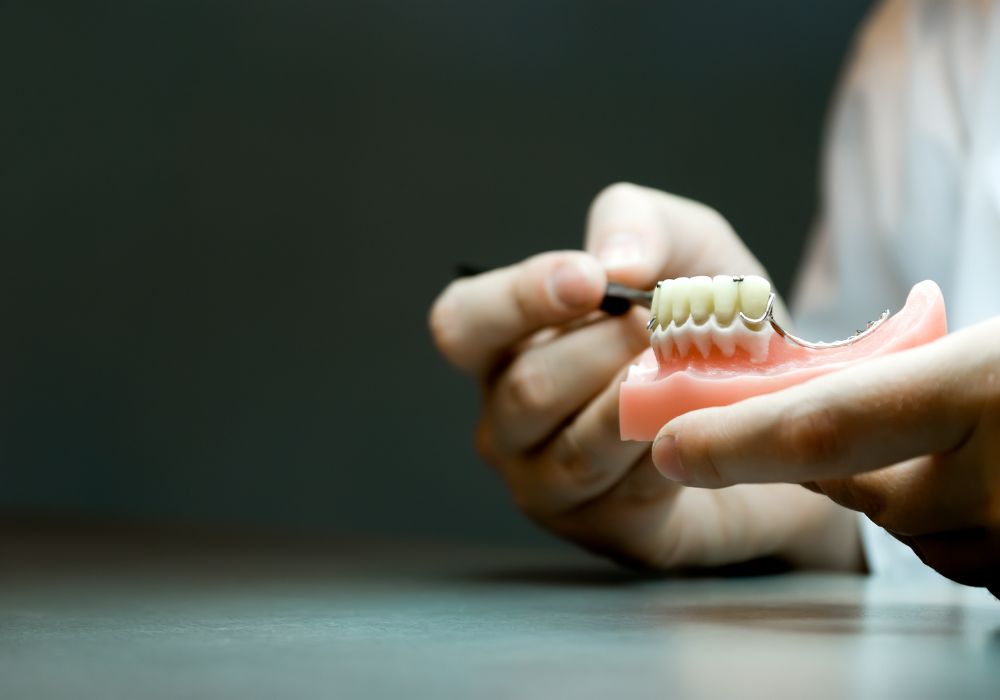
Dentures can become stained from a variety of sources:
Coffee and Tea Staining
The acidic nature of coffee and tea erodes the denture surface over time while also staining the acrylic. Tannins in these drinks impart stubborn yellowish to brown hues that sink into the resin.
Red Wine Discoloration
Richly pigmented wines like cabernet and merlot can soak dentures with hard-to-remove reddish purple stains. White wines also foster faint yellowish discoloration.
Tobacco Use Stains
Smoking, chewing tobacco, dip, snuff and other tobacco products lead to accumulation of yellow-brown tar and nicotine on and below the denture surface. This causes yellowish “tobacco teeth”,
Curry Staining
Spicy foods seasoned with turmeric or curry powder can impart a lasting yellow-orange tint to dentures. The potent curcuminoid pigments penetrate the acrylic resin.
Berry and Cherry Stains
The deeply hued juices of berries, cherries, pomegranates and beets contribute to purple and red staining on dentures. The darker the fruit, the more stubborn the stain.
Dental Plaque Accumulation
Lack of proper oral hygiene allows plaque to build up on teeth, gums, and dentures. This plaque is easily stained brownish in color by food debris, bacteria, and saliva minerals.
Medication Staining
Certain prescription medicines like tetracyclines, antihistamines, antipsychotics, and iron supplements can cause dingy yellow-grey staining of natural teeth and dentures.
Fluorosis Stains
Over-exposure to fluoride can mottle denture surfaces with white spots or patches. Fluoride rinses and dentifrices should be used minimally.
Effective Ways to Remove Stains from Dentures
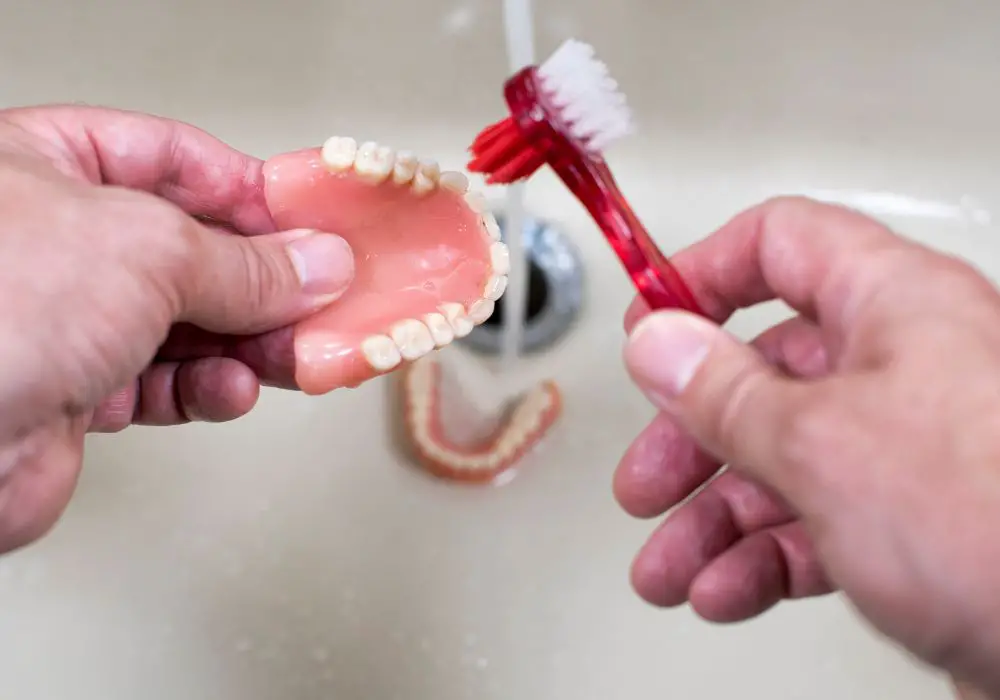
While avoiding stains in the first place is ideal, sometimes discoloration is inevitable. Removing set-in stains from the porous acrylic resin can be challenging but is certainly possible. Here are some of the most effective methods:
Daily Denture Cleanser Soaks
The best way to regularly maintain and clean dentures is by soaking them daily in an alkaline peroxide, hypochlorite, or enzyme-based denture cleansing solution. These powerful active ingredients penetrate and lift stains.
Baking Soda Scrubs
The gritty but gentle abrasiveness of baking soda makes it ideal for rubbing away surface stains on dentures. Create a paste, apply to stained areas, let sit briefly, then gently scrub. Avoid aggressive scrubbing that could damage the delicate resin.
Vinegar Rinses
White distilled vinegar is naturally antibacterial and helps dissolve plaque and stains off dentures without harming the structure. Mix 1 part vinegar 2 parts water for an effective 30-60 minute denture soak. It leaves dentures fresh and stain-free.
Dentist Ultrasonic Cleanings
For the most thorough professional cleaning, dentists can use an ultrasonic cleaner filled with a potent dental detergent to remove the most stubborn, set-in stains from dentures, including tobacco and plaque discoloration.
Bleach Soaks
As a last resort, diluted bleach soaks for 5-10 minutes may lift stubborn yellowish stains. However, bleach is caustic so this method should be used rarely and with extreme care to avoid damage. Thorough rinsing is required.
Effervescent Stain Remover Tablets
Fizzy denture cleaning tablets can be directly applied to stained spots to lift some discoloration. As they dissolve, they release peroxide and bubbles that work to scrub away stain particles.
Avoid Tobacco
For those who smoke or chew tobacco, the only sure way to avoid yellowing and brown tobacco stains on dentures is to quit tobacco use completely. Even cutting back can make a difference.
Professional Relining
If stains have penetrated the denture base itself, a professional reline or rebase may be needed to renew the color and fit of badly stained dentures. A fresh acrylic resin layer hides stains.
Things to Avoid Getting Stains Off Dentures
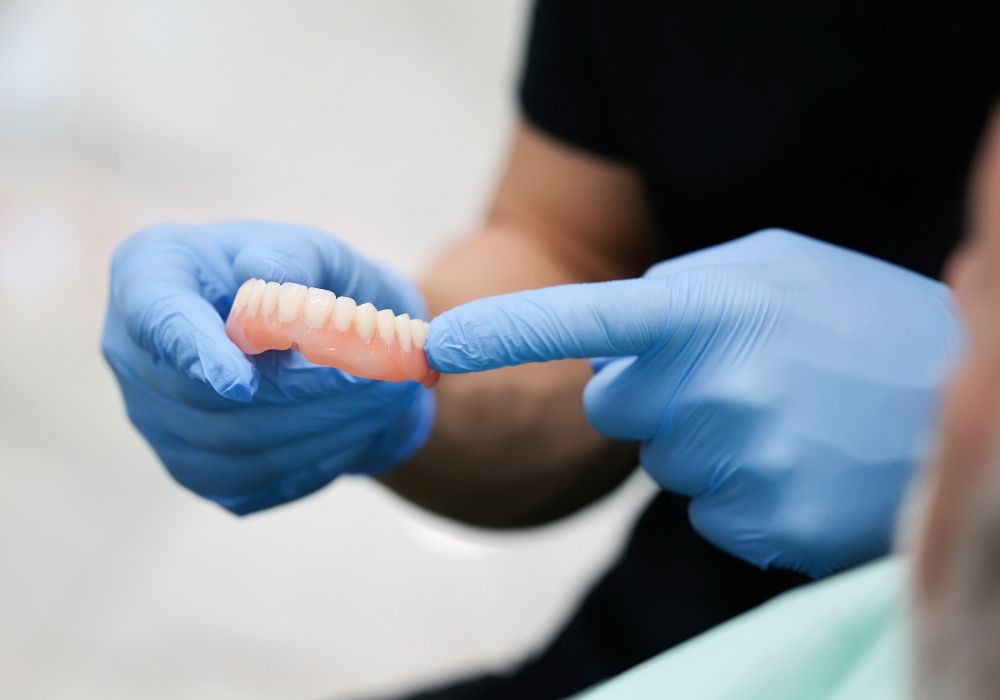
It may be tempting to use household cleaners to remove denture stains, but many can damage the appliance. Avoid:
- Bleach – Highly caustic and can erode dentures quickly even when diluted.
- Toothpaste – Too abrasive for daily use on dentures.
- Hydrogen Peroxide – High concentrations can bleach dentures unevenly.
- Lemon Juice – Very acidic, erodes pink gum portions of dentures.
- Hard-Bristled Brushes – Can scratch and scar denture surfaces.
- Abrasive Cleaners – Scouring powders too rough for delicate resin.
- Boiling – High heat can warp and melt dentures.
- Oven Cleaner – Far too harsh and corrosive for oral use. Causes burns.
- Essential Oils – May degrade denture resin despite claims of whitening ability.
- Whitening Strips – Only designed for natural tooth enamel, not dentures.
Caring for Dentures Between Cleanings
Maintaining that bright, stain-free look in between professional cleanings requires diligent at-home care:
- Brush thoroughly morning and night with a soft brush.
- Remove and soak dentures overnight in water or a mild cleansing solution.
- Use securing creams or adhesive strips to prevent seepage under dentures.
- Drink dark staining beverages like coffee through a straw.
- Rinse dentures thoroughly after consuming staining foods or drinks.
- Have ill-fitting dentures adjusted to prevent liquid pooling underneath.
- Schedule professional cleanings every 6-12 months for a complete removal of stains.
- Consider dental implants to replace stained dentures and prevent future discoloration.
When to See the Dentist for Cleaning
While home care can maintain lightly stained dentures between cleanings, the dentist should perform a deep cleaning at least annually to thoroughly remove all stains and deposits. More frequent professional cleaning may be needed for those who smoke, drink staining beverages, or don’t properly clean their dentures daily. The dentist also inspects for damaged or worn dentures so repairs can be made before small issues turn into permanent stains. With periodic professional cleaning and diligent daily care, dentures can stay like new.
FAQs About Stained Dentures
How do you get stains off old dentures?
For set-in stains on older dentures, use an alkaline peroxide-based commercial denture cleaner for 15-30 minute soaks to penetrate deep stains. For surface stains, gently rub with baking soda paste. Avoid vigorous scrubbing.
Can you put dentures in hydrogen peroxide?
Yes, but avoid full strength drugstore hydrogen peroxide. Use a very diluted bath of 1 part peroxide, 2 parts water for 10-20 minutes maximum to lift stains. Rinse thoroughly. Too much time in peroxide can bleach dentures unevenly.
Do coffee stains ruin dentures?
Coffee and tea can stain dentures but won’t ruin them. The staining is purely cosmetic and can be removed with the use of alkaline cleansers, baking soda rubs, or professional cleanings. Prevent stains by rinsing after drinking and using a straw.
Can you use salt to whiten dentures?
No, salt is ineffective at whitening or disinfecting dentures. It is too coarse and abrasive against the resin. Use a commercial denture cleaner instead for a safe, effective clean.
Why are my dentures turning yellow?
Gradual yellowing of dentures is caused by accumulation of stains in the porous resin over time. Tobacco use, coffee, tea, red wine, curries, plaque buildup, and bacteria cause yellow discoloration. Proper cleaning and avoiding staining foods prevents yellowing.
In summary, false teeth are prone to staining from a variety of sources given their porous acrylic resin construction. But diligent cleaning and stain prevention can keep dentures looking white and bright. Utilize daily cleanser soaks at home and periodic professional cleanings to maintain a beautiful smile.


